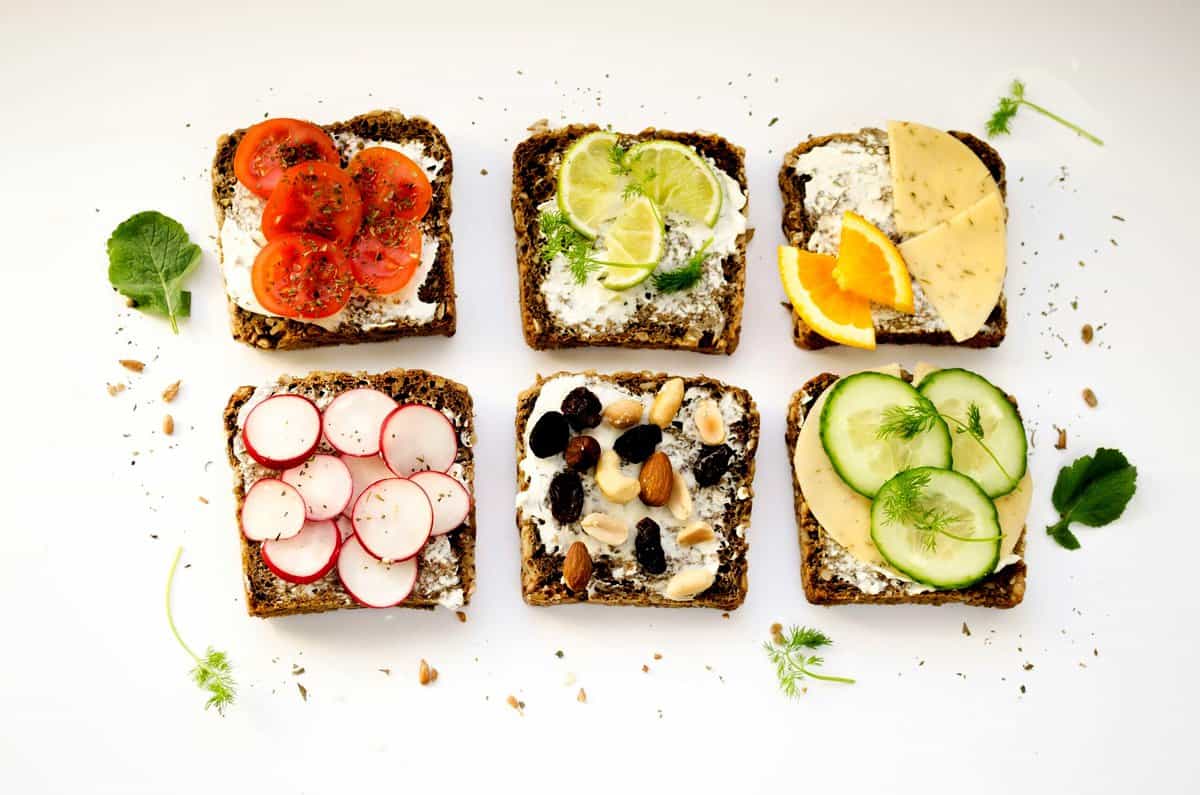It’s time we set the record straight on the perfect macro split to meet your wellness goal. In this post, we discuss how to calculate macros for weight loss , muscle gain, endurance, and more!

General Health Goals
Major health authorities have crafted a recommended macro split for the general population called the Acceptable Macronutrient Distribution Ranges (AMDRs). This split has some flexibility because these things don’t need to be exact, but it’s loosely:
- 45-65% of calories from carbohydrates
- 10-35% of calories from protein
- 20-35% of calories from fat
These ranges are based on what is “associated with reduced risk of chronic disease”. However, when you dive in, our absolute minimum needs are pretty low for carbohydrates and fat, and you could argue that we do not have minimal needs for carbohydrates, considering our bodies can enter a state of ketosis to keep us alive in the absence of carbs. Fat needs are also quite low, excluding minimal needs for essential fatty acids such as Omega 6s and Omega 3s.
That said, going below the AMDRs can increase the risk of hormonal dysfunction. So consuming below 20% of energy from fat can increase the risk of reduced testosterone in men and reduced estrogen in women. And going below 35% of energy needs from carbs has also been shown to increase the risk of low testosterone in men and amenorrhea in active women, particularly when accompanied by a low-calorie diet.
A large reason for this macronutrient split recommendation is not just about the fat, protein, and carbs themselves, but about the micronutrients this dietary pattern encourages. For example, although vitamin and mineral deficiencies leading to disease are rare, carbohydrate restricted diets can result in suboptimal intakes of thiamine, folate, vitamin C, Magnesium and fiber. On the other hand, a fat restricted diet can result in suboptimal intakes of vitamin E and omega 3s. So this is why we generally recommend balance over restriction.
but that leaves us with protein. Aside from water, we have a greater need for protein than any other macronutrient because a large proportion of our body is made up of protein. The recommended protein intake in government guidelines is 0.8 g/kg as the minimum to prevent disease. But we don’t just want to survive, we want to thrive, so the OPTIMAL intake of protein for general health is at least 1.2 g/kg per day, or around 15% of calories. This is particularly important for helping prevent muscle loss as we age, and it’s basically what people on non-restrictive diets are getting anyway.
So to quickly recap this section, if the goal is to maintain good health, a varied diet consisting mostly of whole foods, 45-65% carbohydrate, 20-35% fat, and a protein intake of at least 1.2 g/kg or around 15-35% will be ideal for most adults.

WEIGHT LOSS
Now let’s discuss how to calculate macros for weight loss. Although the ketos and the frugavores could argue all day on whether we should be limiting carbs or fat, respectively, the reality is, it doesnt actually matter when it comes to fat loss rate. The differences have been described as “physiologically meaningless”.
Not just that, but according to the DIETFITs trial there was no difference in fat loss rates regardless of whether someone had the genetics to supposedly present as more “fat responsive”, or “carb responsive”, or how insulin sensitive someone was. Some people will just find low fat easier, some find low carb easier. Long term tolerance and adherence are what matter most for weight loss success.
So now that we know that specific amounts of carbs and fat are less important for weight loss, let’s talk about what IS important- protein.
Protein is the one main macronutrient that can make a difference in fat loss rates. Higher protein intakes have been shown to result in more weight loss and less lean mass loss, leading to as much as a 3x greater effect on fat loss when going from a diet that is about 10-15% protein to one that is 20-30% protein.
There are a few reasons for this when wanting to calculate macros for weight loss:
- Protein is the king in the satiety hierarchy in my hunger-crushing combo so it helps with appetite control and diet adherence better than any other food component. So for example, one study found that people spontaneously ate over 400 calories less when they increased calories from protein from 15% to 30%.
- Protein uses more energy for processes such as protein synthesis, which burns calories and can therefore contribute to the caloric deficit.
- You need more protein to stimulate protein synthesis when you’re in a caloric deficit, so a higher protein intake helps spare muscle mass from being broken down as fuel.
So protein is king for weight loss, but how much is enough? Ultimately this will depend on the size of the calorie deficit. The greater the percentage of energy deficiency for weight loss, the more protein is recommended. If we consider that most people should be aiming for 0.5-1% weight loss per week, a rate that also allows for optimal retention of muscle mass, then that coincides with about a 20% deficit and at least 1.8 g/kg of protein.
In summary, the percentage of carbs and fat matter a lot less than protein when it comes to weight loss, but while we are in a calorie deficit, we want to push our protein intake towards around the 30% range-at least 1.8 g/kg while maintaining the general AMDRs for carbs and fat. Also, remember that weight loss is both difficult and poses a risk to your relationship with food, so work with a dietitian like one from Unlocked if this one is your goal to both reduce this risk and increase your chances of keeping it off.
MUSCLE GAIN

As we’ve now seen, there’s a baseline for protein that unless you’re on an extreme frugavore diet, you’re almost surely meeting. Needs increase when in a calorie deficit, and they can potentially increase on a per kg of body weight basis even further when the goal is muscle gain. As this systematic review found, optimal muscle mass gains come at 1.6 to 2.2 g/kg/d of protein intake so that’s about 0.75-1 gram per lb of body weight. But because only so much protein can be used for muscle protein synthesis in one sitting, research like this review paper from our friend Eric at Unlocked Nutrition shows that it’s important to spread out your intake with at least 0.3 g/kg in 4-5 meals or snacks. Usually, this is around the 20-35 gram per meal mark.
Again, the other macronutrients, fat and carbs, are less important for muscle gain. BUT there is evidence that a low carb diet can result in lower performance during strength workouts, which would impact your rate of muscle and strength gain over time, giving it a slight edge over fat in terms of importance.
To summarize, if muscle gain is the goal, you’re not going to be in the same caloric deficit that you would be for weight loss. You might even be in a caloric surplus. So even though the total grams per kilogram of protein could potentially be the same or higher, around 1.6-2.2g/kg, the percentage of calories from protein is lower than seen with weight loss when we have to be mindful of sparing muscle. So generally this looks like around 20% of calories from protein per day spread out between several meals, and again staying within ADMR range for carbs and fat.
Endurance
Finally, let’s talk about endurance exercise goals, things like moderate to vigorous longer sessions of running, biking, swimming etc. Here, the tables turn and carbohydrates start to really matter. As you can see in this chart, the higher the intensity and the longer the workout, the more carbohydrate is needed to help fuel activity and refill those glycogen stores.
| Intensity | Time | Carbohydrate recommendation | |
| Low-moderate | ≤1 hr | 3-5 g/kg | 1.36-2.27 g/lb |
| Moderate-vigorous | 1 hr | 5-7 g/kg | 2.27-3.18 g/lb |
| Moderate-vigorous | 1-3 hr | 5-10 g/kg | 2.27-4.55 g/lb |
| Moderate-vigorous | >4 hr | 8-12 g/kg | 3.64-5.45 g/lb |
We also need to consider protein. This one may surprise you but folks who are endurance training for 1-2 hours of at least moderate intensity training need 1.8 g of protein/kg, which is on par with the recommendations for weight loss and muscle gain. This is because protein is used as a fuel source during endurance exercise and what you burn off, needs to be replaced afterward. Also, don’t forget that protein is important for more than just muscle size. There are many adaptations to endurance exercise that involve proteins in our body like mitochondria, blood vessels, and the heart. This was part of Eric from Unlocked’s PhD thesis who suggests that if you’re exercising for over an hour of at least moderate intensity, you should be aiming for 1.8g/kg or 15% of energy needs from protein, whichever one is higher.
Interestingly, endurance is the only scenario where macros differ between the sexes. Women use more fat as fuel and less carbohydrates, but the difference only ends up being an average of less than 10 grams of carbohydrates used per hour by women compared to men. That’s like 3 spoons of rice. Definitely not enough to stress over. Interestingly, women have lower protein needs in the follicular phase of their menstrual cycle, but their needs during the luteal phase are the same as men so again, we keep protein recommendations steady across the cycle to prevent deficiency.
So to summarize, protein and carbs are particularly important for endurance. Your calorie needs will be high when doing intense endurance exercise, so even though protein needs are quite high, around 1.8g/kg, it amounts to the general health average of around 15% of your calories from protein. A higher proportion of calories should be coming from carbs depending on your intensity so around the 60-65% mark, and filling the rest of the gaps with fat.
Bottom Line
Depending on your goals, your caloric needs and macro splits will be very different. Whether you are looking to calculate macros for weight loss, muscle gain, or endurance, these needs are highly individualized. So if you have specific goals, I highly recommend working with a dietitian like my colleagues at Unlocked.

More Blog Posts You Might Like
Interested in all things nutrition & wellness? Check out some of my favorite posts on the blog!
- SIMPLE LIFE CHANGING HEALTH AND WELLNESS TIPS FROM A REGISTERED DIETITIAN
- BEST FOODS FOR HEART HEALTH | TOP 10 FOODS ACCORDING TO A DIETITIAN
- WELLNESS TIPS + MISTAKES TO AVOID FROM A REGISTERED DIETITIAN | SHOULD YOU WEIGH YOURSELF DAILY?
- INTUITIVE EATING PRINCIPLES | HOW TO REJECT THE DIET MENTALITY
Have you found a macro split that works best for you? Have you tried to calculate your macros for weight loss, muscle gain, or endurance? I would love to hear your stories!
Updated on April 2nd, 2024






Leave a Comment